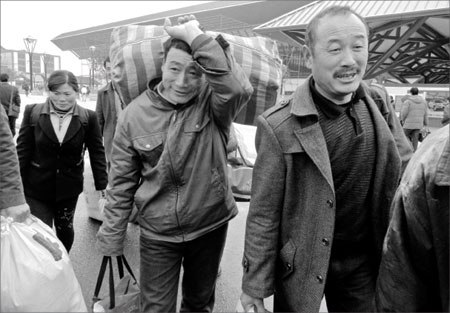Rural exodus to cities continues
Updated: 2012-08-08 11:35
By Shan Juan (China Daily)
|
||||||||
|
The National Population and Family Planning Commission says in its third annual report that at the end of 2011 there were about 230 million people classified as migrants, accounting for about 17 percent of the population. Provided to China Daily |
Six out of 10 Chinese people will live in cities by 2020 as the exodus from rural areas continues to boost the migrant population, a report said.
China reached a landmark moment last year when 51.27 percent of the population was classified as urban dwellers.
At the end of 2011 there were about 230 million people classified as migrants, accounting for about 17 percent of the population, and 80 percent of these came from rural areas, the National Population and Family Planning Commission said in its third annual report.
Migrants are defined as people who live away from their registered place of hukou, or residence permit.
"Providing services for the colossal migrant population is related to economic development and social stability," Wang Qian, who heads the commission's migrant services and management department, told China Daily on Tuesday.
Over the past three decades the migrant population increased annually by about 10 million.
Migrants stay at a work location for five years on average, making a major contribution to the economy, the report said.
However, they miss out on social services like insurance and welfare programs, which are linked to the hukou, Yuan Xin, a professor at Nankai University's population and development institute in Tianjin, said.
Welfare priorities are work-related benefits and their children's education, Wang said.
According to the report, less than 30 percent of migrants are covered by local insurance.
Only 51.3 percent of migrants hold fixed-term contracts and they work an average of 54.6 hours a week, far above the 40-hour legal limit.
The average monthly pay for migrant workers under 35 was 2,513 yuan ($400) in 2011, which hardly covered housing and healthcare expenses.
The figure, however, represented a 29.4 percent increase from 2009.
The monthly pay is obviously better for migrants with a degree, averaging 4,608 yuan, it said.
Zhao Min, a sales manager who earns nearly 10,000 yuan a month in Beijing, has just applied for a master's degree program at the Central University of Finance and Economics in Beijing.
"Once I get the degree I might get a job offer that can give me a Beijing hukou and then my son could land it too," she said.
"Without the hukou my 1-year-old son will hardly secure a place at a good kindergarten, elementary or middle school," Zhao said.
The commission's Wang said the government recognizes the problem.
Many counties and small cities have already loosened hukou regulations allowing migrants the same social services as residents.
Reform of the system is under discussion in large cities such as Beijing and Shanghai.
"It's a priority to offer all the social services to migrants regardless of hukou," Wang said.
shanjuan@chinadaily.com.cn

 Relief reaches isolated village
Relief reaches isolated village
 Rainfall poses new threats to quake-hit region
Rainfall poses new threats to quake-hit region
 Funerals begin for Boston bombing victims
Funerals begin for Boston bombing victims
 Quake takeaway from China's Air Force
Quake takeaway from China's Air Force
 Obama celebrates young inventors at science fair
Obama celebrates young inventors at science fair
 Earth Day marked around the world
Earth Day marked around the world
 Volunteer team helping students find sense of normalcy
Volunteer team helping students find sense of normalcy
 Ethnic groups quick to join rescue efforts
Ethnic groups quick to join rescue efforts
Most Viewed
Editor's Picks

|

|

|

|

|

|
Today's Top News
Health new priority for quake zone
Xi meets US top military officer
Japan's boats driven out of Diaoyu
China mulls online shopping legislation
Bird flu death toll rises to 22
Putin appoints new ambassador to China
Japanese ships blocked from Diaoyu Islands
Inspired by Guan, more Chinese pick up golf
US Weekly

|

|







